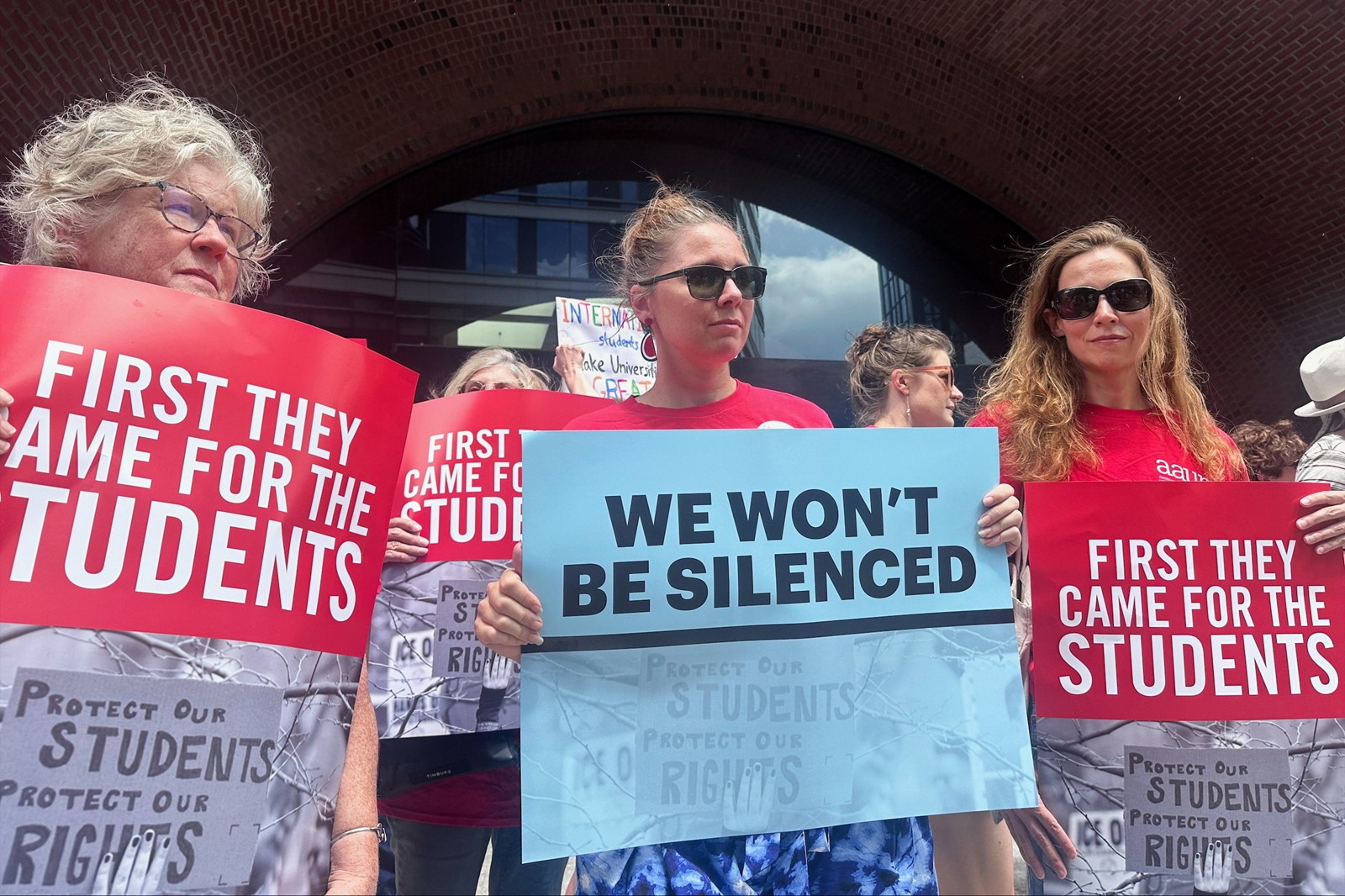
BOSTON >> Plaintiffs in a lawsuit challenging the Trump administration’s campaign of arresting and deporting college faculty and students who participated in pro-Palestinian demonstrations spent the first few days of the trial showing how the crackdown silenced scholars and targeted more than 5,000 protesters.
The lawsuit, filed by several university associations, is one of the first against President Donald Trump and members of his administration to go to trial. Plaintiffs want U.S. District Judge William Young to rule that the policy violates the First Amendment and the Administrative Procedure Act, a law that governs how federal agencies develop and issue regulations.
No ideological deportation policy
On Friday, a top State Department official testifying for the government insisted there was no ideological deportation policy as the plaintiffs contend.
John Armstrong, senior bureau official in Bureau of Consular Affairs, told the court that visa revocations were based on long-standing immigration law. Armstrong acknowledge he played a role in the visa revocation of several high-profile activist including Rumeysa Ozturk and Mahmoud Khalil, and was shown memos endorsing their removal.
“We did not create a new policy or procedure here,” Armstrong told the court, adding that Trump’s executive orders on terrorism and combating antisemitism only served to reinforce existing policy and require a review of current practices.
Armstrong also insisted that visa revocation were not based on protected speech and called the allegation there is a policy targeting someone’s ideology “groundless.”
“It’s silly to suggest there is a policy,” he said.
Earlier in the day, attorneys for the plaintiffs pressed a second State Department official over whether protests were grounds for revoking a student’s visa, repeatedly invoking several cables issued in response to Trump’s executive orders as examples of policy guidance.
But Maureen Smith, a senior adviser in the State Department’s Bureau of Consular Affairs, said protest alone wasn’t a critical factor. She wasn’t asked specifically about pro-Palestinian protests.
“It’s a bit of a hypothetical question. We would need to look at all the facts of the case,” she said. “If it were a visa holder who engages in violent activity, whether it’s during a protest or not — if they were arrested for violent activity — that is something we would consider for possible visa revocation.”
Smith also said she didn’t think a student taking part in a nonviolent protest would be a problem but said it would be seen in a “negative light” if the protesters supported terrorism. She wasn’t asked to define what qualified as terrorism nor did she provide examples of what that would include.
Were student protesters targeted?
One key witness was Peter Hatch, who works for the Homeland Security Investigations unit of Immigration and Customs Enforcement. Over two days of testimony, Hatch told the court a “Tiger Team” was formed in March — after the two executive orders that addressed terrorism and combating antisemitism — to investigate people who took part in the protests.
Hatch said the team received as many as 5,000 names of protesters and wrote reports on about 200 who had potentially violated U.S. law. The reports, several of which were shown in court Thursday, included biographical information, criminal history, travel history and affiliations with pro-Palestinian groups as well as press clips and social media posts on their activism or allegations of their affiliation with Hamas or other anti-Israel groups.
Until this year, Hatch said, he could not recall a student protester being referred for a visa revocation.
“It was anything that may relate to national security or public safety issues, things like: Were any of the protesters violent or inciting violence? I think that’s a clear, obvious one,” Hatch testified. “Were any of them supporting terrorist organizations? Were any of them involved in obstruction or unlawful activity in the protests?”
Among the report subjects were Palestinian activist and Columbia University graduate Khalil, released last month after 104 days in federal immigration detention. Khalil has become a symbol of Trump’s clampdown on the protests.
Another was Tufts University student Ozturk, released in May from a Louisiana facility. She spent six weeks in detention after she was arrested while walking on the street of a Boston suburb. She says she was illegally detained following an op-ed she cowrote last year criticizing the school’s response to the war in Gaza.
Hatch also acknowledged that most of the names came from Canary Mission, a group that says it documents people who “promote hatred of the U.S.A., Israel and Jews on North American college campuses.” The right-wing Jewish group Betar was another source, he said.
Hatch said most leads were dropped when investigators could not find ties to protests and the investigations were not inspired by a new policy but rather a procedure in place at least since he took the job in 2019.


 PREVIOUS ARTICLE
PREVIOUS ARTICLE
